(完整版)一般现在时和特殊疑问句讲解及练习
(完整版)英语一般疑问句和特殊疑问句的讲解及练习(最新整理)

一般疑问句用Yes 或No 作答的疑问句叫一般疑问句。
其结构是be 动词(am /is /are ) /助动词/情态动词+主语+其他成分通常回答为:肯定:Yes,+主语+提问的词.否定:No,+主语+提问的词+not.Are you from Japan﹖Yes ,I am./ No, I'm not.Is her sister doing her homework now﹖Yes, she is./ No, sheisn't.Does he work in a bank﹖Yes, he does./ No, he doesn't.Can you speak French﹖Yes, I can./ No, I can't.一: 般疑问句还有下列特点:1、以be 动词、助动词或情态动词开头;例:Is your father a teacher? Does Catherine like animals? Can Jenny speak French?二: 如何将陈述句变成一般疑问句?要将陈述句变成一般疑问句,可以遵循下列步骤:1.如句中有be 动词(am、is、are、was、were)情态动词(can、may、must …)或助动词(do、does、did、 have、had(完成时中))时,可直接将它们提到句首,句末打上问号即可。
主语为第一人称,应将其改为第二人称。
例:It was rainy yesterday.→Was it rainy yesterday?Tom's father can play the piano.→Can Tom's father play the piano?I have finished my homework.→Have you finished your homework?2.如果句中没有be 动词、助动词或情态动词,则根据谓语动词的形式借助do 的相应形式放在句首。
(完整版)小学英语时态讲解及练习(最新整理)
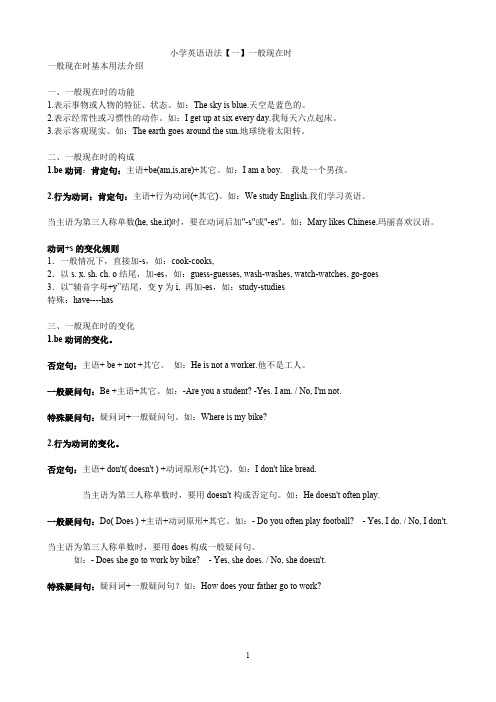
小学英语语法【一】一般现在时一般现在时基本用法介绍一、一般现在时的功能1.表示事物或人物的特征、状态。
如:The sky is blue.天空是蓝色的。
2.表示经常性或习惯性的动作。
如:I get up at six every day.我每天六点起床。
3.表示客观现实。
如:The earth goes around the sun.地球绕着太阳转。
二、一般现在时的构成1.be动词:肯定句:主语+be(am,is,are)+其它。
如:I am a boy. 我是一个男孩。
2.行为动词:肯定句:主语+行为动词(+其它)。
如:We study English.我们学习英语。
当主语为第三人称单数(he, she,it)时,要在动词后加"-s"或"-es"。
如:Mary likes Chinese.玛丽喜欢汉语。
动词+s的变化规则1.一般情况下,直接加-s,如:cook-cooks,2.以s. x. sh. ch. o结尾,加-es,如:guess-guesses, wash-washes, watch-watches, go-goes3.以“辅音字母+y”结尾,变y为i, 再加-es,如:study-studies特殊:have----has三、一般现在时的变化1.be动词的变化。
否定句:主语+ be + not +其它。
如:He is not a worker.他不是工人。
一般疑问句:Be +主语+其它。
如:-Are you a student? -Yes. I am. / No, I'm not.特殊疑问句:疑问词+一般疑问句。
如:Where is my bike?2.行为动词的变化。
否定句:主语+ don't( doesn't ) +动词原形(+其它)。
如:I don't like bread. 当主语为第三人称单数时,要用doesn't构成否定句。
(完整版)一般现在时和特殊疑问句讲解及练习
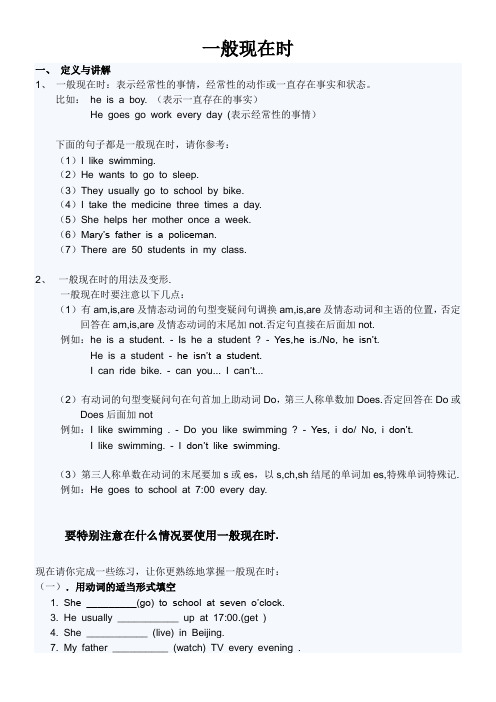
一般现在时一、定义与讲解1、一般现在时:表示经常性的事情,经常性的动作或一直存在事实和状态。
比如:he is a boy. (表示一直存在的事实)He goes go work every day (表示经常性的事情)下面的句子都是一般现在时,请你参考:(1)I like swimming.(2)He wants to go to sleep.(3)They usually go to school by bike.(4)I take the medicine three times a day.(5)She helps her mother once a week.(6)Mary’s father is a policeman.(7)There are 50 students in my class.2、一般现在时的用法及变形.一般现在时要注意以下几点:(1)有am,is,are及情态动词的句型变疑问句调换am,is,are及情态动词和主语的位置,否定回答在am,is,are及情态动词的末尾加not.否定句直接在后面加not.例如:he is a student. - Is he a student ? - Yes,he is./No, he isn’t.He is a student - he isn’t a student.I can ride bike. - can you... I can’t...(2)有动词的句型变疑问句在句首加上助动词Do,第三人称单数加Does.否定回答在Do或Does后面加not例如:I like swimming . - Do you like swimming ? - Yes, i do/ No, i don’t.I like swimming. - I don’t like swimming.(3)第三人称单数在动词的末尾要加s或es,以s,ch,sh结尾的单词加es,特殊单词特殊记.例如:He goes to school at 7:00 every day.要特别注意在什么情况要使用一般现在时.现在请你完成一些练习,让你更熟练地掌握一般现在时:(一).用动词的适当形式填空1. She _________(go) to school at seven o’clock.3. He usually ___________ up at 17:00.(get )4. She ___________ (live) in Beijing.7. My father __________ (watch) TV every evening .9.________ Amy _________ (read) English every day10. Chen Jie sometimes _________(go)to the park with her sister.(二).选择填空1.I want____homework now.A. doingB. to doC. to do myD. do my2.It's time______.A. go to schoolB. play gamesC. to go homeD. to do my homeworks3.______go and help her.A. Let's meB. Let's usC. Let'sD. Let's to4.Do they have a new car? Yes,_____.A .they are B.they have C. they don't D. they do5.He often _________ supper at 6:00 in the evening.A. haveB. has c. is having D. is eating6. We _____________ any Chinese classes on Friday.A. are havingB. aren’t havingC. don’t haveD. are have(三)、用括号内动词的适当形式填空。
(完整版)一般现在时讲解+练习
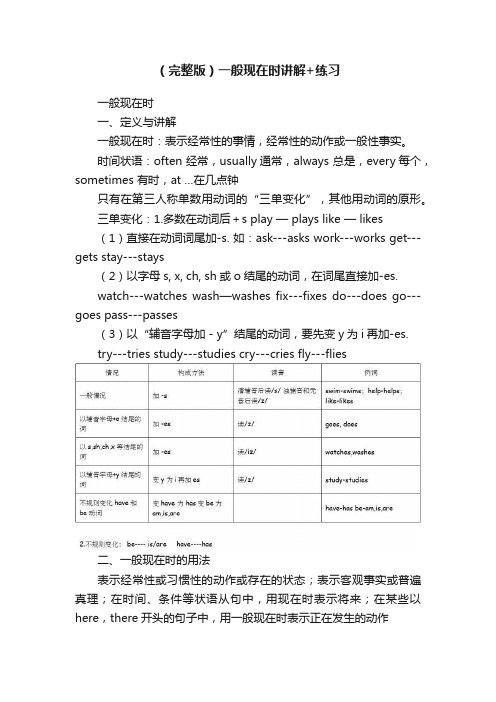
(完整版)一般现在时讲解+练习一般现在时一、定义与讲解一般现在时:表示经常性的事情,经常性的动作或一般性事实。
时间状语:often 经常,usually通常,always 总是,every每个,sometimes 有时,at …在几点钟只有在第三人称单数用动词的“三单变化”,其他用动词的原形。
三单变化:1.多数在动词后+s play — plays like — likes(1)直接在动词词尾加-s. 如:ask---asks work---works get---gets stay---stays(2)以字母s, x, ch, sh或o结尾的动词,在词尾直接加-es.watch---watches wash—washes fix---fixes do---does go---goes pass---passes(3)以“辅音字母加 - y”结尾的动词,要先变y为i再加-es.try---tries study---studies cry---cries fly---flies二、一般现在时的用法表示经常性或习惯性的动作或存在的状态;表示客观事实或普遍真理;在时间、条件等状语从句中,用现在时表示将来;在某些以here,there开头的句子中,用一般现在时表示正在发生的动作当主语是第三人称单数时:1、动词变相应的第三人称单数形式2、肯定句主语+动词s+其它3、否定句主语+doesn't+动词原形+其它4、一般疑问句Does+主语+动词原形+其它5、肯定回答 Yes,主语+does6、否定回答 No,主语+doesn't7、特殊疑问句特殊疑问词+一般疑问句当主语不是第三人称单数时:1、肯定句主语+动词原形+其它2、否定句主语+don't+动词原形+其它3、一般疑问句 Do+主语+动词原形+其它4、要注意,句式结构错则全都错。
5、谓语动词的形式:do/does一般现在时练习一、用所给词的正确形式填空1. We often ___________ (play) on the playground.2. He _________ (get) up at six o’clock.3. __________you _________ (brush) your teeth every morning.4. What____ (do) he usually _____ (do) after school?5. Danny _______ (study) English, Chinese, Math, Science and Art at school.6. Mike sometimes __________ (go) to the park with his sister.7. At eight at night, she ________ (watch) TV with his parents.8. ________ Mike________ (read) English every day?9. How many lessons ______your classmate____ (have) on Monday?10. What time ____his mother_________ (do) the housework?11. He often ______ (have) dinner at home. 12. Daniel and Tommy___ (be) in Class One. 13. We____ (not watch) TV on Monday. 14. Nick _____(not go) to the zoo on Sunday.15. They______ (like) the World Cup? 16. What ____they often ____ (do) on Saturdays17. Your parents________ (read) newspapers every day?18. The girl______ (teach) us English on Sundays.19. She and I _______ (take) a walk together every evening.20. There_______ (be) some water in the bottle. 21. Mike ______ (like) cooking.22. They_______ (have) the same hobby. 23. My aunt______ (look) after her baby carefully.24. You always____ (do) your homework well. 25. I_____ (be) ill. I’m sta ying in bed.26. She_____ (go) to school from Monday to Friday. 27. Liu Tao _____ (do) not like PE.28. The child often______ (watch) TV in the evening.29. Su Hai and Su Yang ______(have) eight lessons this term.30. -What day ______(be) it today? -It’s Saturday.31. Don’t make a noise. Grandpa __________ (sleep).32. Tom’s family__________ (watch) TV.33. It ________ (take) me two hours to finish my homework last night.34. What ______ your mother _______ (do) every evening? She_______ (wash) clothes.35. _______ it ______ (rain) every day?36. What _______ (do) you _______ on Sundays? We ________ (play) football.37. There ________ (be) a football match on TV every morning.38. They often ________ (visit) the Great Wall.39. Who _______ (dance) the best in your class?40. He _____________ (not come).41. The earth __________ (move) round the sun.42 She ________ (buy) a sweater.43. Mr. Wang often______ (go) to Shanghai.二、改句子1. Do you often play football after school? (肯定回答)_______________________________2. I have many books. (改为否定句)_______________________________3. Gao Shan's sister likes playing table tennis (改为否定句)________________________4. She lives in a small town near New York. (改为一般疑问句)________________________5. I watch TV every day. (改为一般疑问句)________________________6. David has a goal. (改为一般疑问句)________________________7. We have four lessons.(否定句)________________________8. Nancy doesn’t run fast (肯定句)________________________9. My dog runs fast. (一般疑问句) ________________________(把10—14小题变否定句,一般疑问句和划线提问)10. Mike has two letters for him. ________________________11. I usually play football on Friday afternoon.________________________12. Su Yang usually washes some clothes on Saturday. ________________________13. Mingming usually waters the flowers every day. ________________________14. Tom does his homework at home. ________________________三、写出下列动词的第三人称单数形式:1. wash_________ match _______ guess______ study______finish_________ go________ snow______ carry_________2. stop______ see________ drive ________let_______ carry______keep_____ join______ find_______ think________ teach______ catch______3. stay_______ begin______ forget_______ lie________ die _______run_______ prefer______ give________ ring_______ dance______ hope_______四、单项选择:1. There _____ an English film at the cinema now.A. will haveB. is going to haveC. is going to beD. is2. The picture _______ nice. A. looks B. is looked C. look D. is looking3. She ______ down and soon falls asleep. A. live B. lain C. laidD. sits4. They _____ the office in time very morning. A. reach to B. arrived C. went D. get to5. We shall go to Shanghai on business before you _____ back next week.A. will comeB. cameC. would comeD. come6. The plane ______ over there. A. is B. are C.am D. was7. I see her ____ the room this morning. A. to enter B. enteredC. enterD. enters8. The teacher ________us to come to school on time. A. ask B. asking C. asks D. asked9. John always ______ others. A. help B. helping C. helps D. to help10. He ______for eight hours every day. A. working B. to workC. worksD. worked11. You’d better ______ at home and ______ your homework.A. to stay, doB. stay, doC. to stay, to doD. stay, to do12. He sits down and ______ a rest. A. having B. have C. to haveD. has13. Uncle Wang never ______ a cake. A. make B. to make C. making D. makes五、请写出下列句子1.他每天早上七点乘公交车去上学。
四年级英语一般现在时特殊疑问句练习题40题含答案解析
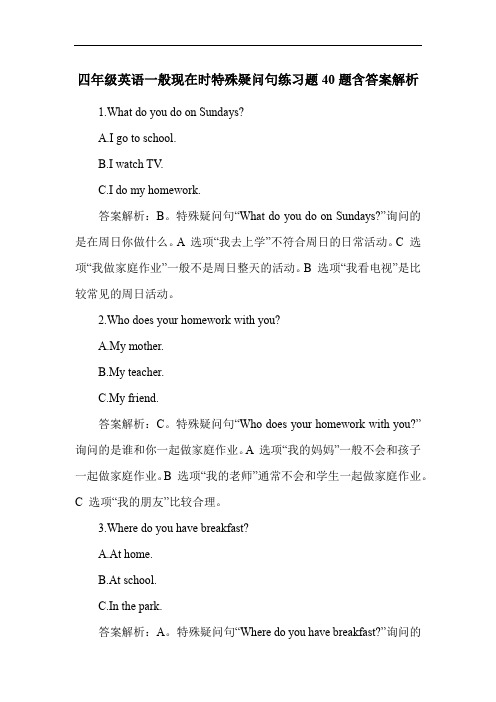
四年级英语一般现在时特殊疑问句练习题40题含答案解析1.What do you do on Sundays?A.I go to school.B.I watch TV.C.I do my homework.答案解析:B。
特殊疑问句“What do you do on Sundays?”询问的是在周日你做什么。
A 选项“我去上学”不符合周日的日常活动。
C 选项“我做家庭作业”一般不是周日整天的活动。
B 选项“我看电视”是比较常见的周日活动。
2.Who does your homework with you?A.My mother.B.My teacher.C.My friend.答案解析:C。
特殊疑问句“Who does your homework with you?”询问的是谁和你一起做家庭作业。
A 选项“我的妈妈”一般不会和孩子一起做家庭作业。
B 选项“我的老师”通常不会和学生一起做家庭作业。
C 选项“我的朋友”比较合理。
3.Where do you have breakfast?A.At home.B.At school.C.In the park.答案解析:A。
特殊疑问句“Where do you have breakfast?”询问的是你在哪里吃早餐。
B 选项“在学校”一般不在学校吃早餐。
C 选项“在公园”也不是吃早餐的常见地点。
A 选项“在家”是比较合理的。
4.When do you get up in the morning?A.At 6:00.B.At 7:00.C.At 8:00.答案解析:B。
特殊疑问句“When do you get up in the morning?”询问的是早上你什么时候起床。
根据一般小学生的起床时间,7 点比较合理。
A 选项6 点有点早,C 选项8 点可能上学就迟到了。
5.How do you go to school?A.By bus.B.By bike.C.On foot.答案解析:A。
初中英语八大时态全套精讲及练习题(附答案)
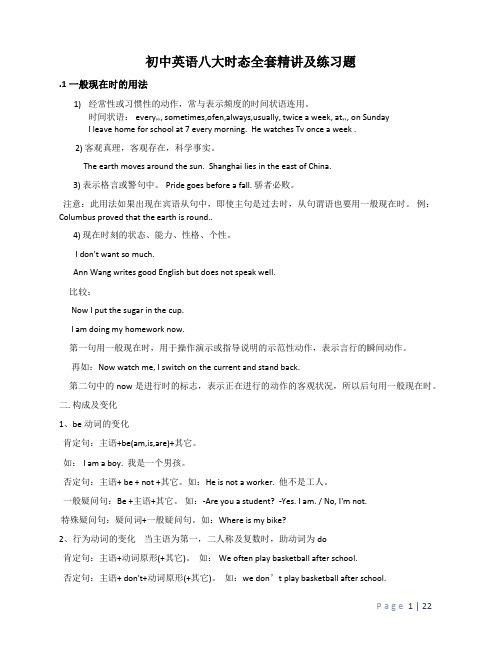
初中英语八大时态全套精讲及练习题.1 一般现在时的用法1)经常性或习惯性的动作,常与表示频度的时间状语连用。
时间状语: every…, sometimes,ofen,always,usually, twice a week, at…, on SundayI leave home for school at 7 every morning. He watches Tv once a week .2) 客观真理,客观存在,科学事实。
The earth moves around the sun. Shanghai lies in the east of China.3) 表示格言或警句中。
Pride goes before a fall. 骄者必败。
注意:此用法如果出现在宾语从句中,即使主句是过去时,从句谓语也要用一般现在时。
例:Columbus proved that the earth is round..4) 现在时刻的状态、能力、性格、个性。
I don't want so much.Ann Wang writes good English but does not speak well.比较:Now I put the sugar in the cup.I am doing my homework now.第一句用一般现在时,用于操作演示或指导说明的示范性动作,表示言行的瞬间动作。
再如:Now watch me, I switch on the current and stand back.第二句中的now是进行时的标志,表示正在进行的动作的客观状况,所以后句用一般现在时。
二. 构成及变化1、be动词的变化肯定句:主语+be(am,is,are)+其它。
如: I am a boy. 我是一个男孩。
否定句:主语+ be + not +其它。
如:He is not a worker. 他不是工人。
最新一般现在时讲解以及练习题资料

语法讲解一:一般现在时一般现在时的讲解思路:一、定义二、一般现在时常用时间状语、时间副词三、用法:1 •肯定句:2.否定句:3.疑问句:4.特殊疑问句:一般现在时的讲解以及练习题一、定义:一般现在时表示经常或习惯性的动作,也可表示现在的状态或主语具备的性格和能力。
例:(1).表示事物或人物的特征、状态。
The sky is blue. 天空是蓝色的。
(2).表示经常性或习惯性的动作。
I get up at six every day. 我每天六点起床。
(3).表示客观现实。
The earth goes around the sun. 地球绕着太阳转。
二、一般现在时常用时间状语、时间副词In the morni ng/afterno on /eve ningevery week (day, year, mon th…)on Sun days (Mon day, Tuesday-)at ni ght, once a week,.Always 总是,usually 通常,often 经常,sometimes有时,never 从不三、用法:1 •肯定句:(1) 句中有be (am is , are )和情态动词时,①be动词时,主语是I时要用am主语是you时要用are ,其他用is②是情态动词时,后面的动词用原型③例:I am a student.You are very beautiful.She is my best friend.He can do his homework by himself(2)没有be (am is, are )动词和情态动词:主语为第三人称单数(she ,he ,it )、单数可数名词、不可数名词的,动词要按规则加上s或es;主语是复数可数名词的肯定句,动词用原形。
例:①She(He, It )likes fish. 她(他,它)喜欢鱼。
(主语为第三人称单数②The table has four legs.桌子有四条腿。
一般现在时特殊疑问句

Key sentences
3.well, I usually get up at around six fifteen. Well,语气词,用于话语的延续. Usually,频率副词,通常用于一般现在时的句子中, 位置在系动词或助动词的后面,行为动词的前面. He usually goes to bed at nine o’clock. Around=about “大约”,常与数词连用,位于数词前. 4.he gets home at 7:00, and he watches morning TV. Get to “到达某地” 接here/there/home,省to.
一般现在时特殊疑问句一般现在时一般过去时特殊疑问句现在完成时疑问句特殊疑问句练习题一般将来时特殊疑问句一般现在时疑问句法语特殊疑问句特殊疑问句讲解特殊疑问句练习
Unit11 What time do you go to school? By Yiduo Chen
Key sentences
1. What time do you go to school? 一般现在时特殊疑问句: 疑问词+do /does+主语+谓语…? Go to school “去上学” Go to the school “去那所学校,不一定去读书”
Key sentences
5. Can you think what his job is? 本句时含有宾语从句的复合句,宾语从句要 使用陈述句的语序. I don’t know where he is now. 6. Thanks for your letter. Thanks for something/ doing something. Thanks for helping me carry the books.
- 1、下载文档前请自行甄别文档内容的完整性,平台不提供额外的编辑、内容补充、找答案等附加服务。
- 2、"仅部分预览"的文档,不可在线预览部分如存在完整性等问题,可反馈申请退款(可完整预览的文档不适用该条件!)。
- 3、如文档侵犯您的权益,请联系客服反馈,我们会尽快为您处理(人工客服工作时间:9:00-18:30)。
一般现在时一、定义与讲解1、一般现在时:表示经常性的事情,经常性的动作或一直存在事实和状态。
比如:he is a boy. (表示一直存在的事实)He goes go work every day (表示经常性的事情)下面的句子都是一般现在时,请你参考:(1)I like swimming.(2)He wants to go to sleep.(3)They usually go to school by bike.(4)I take the medicine three times a day.(5)She helps her mother once a week.(6)Mary’s father is a policeman.(7)There are 50 students in my class.2、一般现在时的用法及变形.一般现在时要注意以下几点:(1)有am,is,are及情态动词的句型变疑问句调换am,is,are及情态动词和主语的位置,否定回答在am,is,are及情态动词的末尾加not.否定句直接在后面加not.例如:he is a student. - Is he a student ? - Yes,he is./No, he isn’t.He is a student - he isn’t a student.I can ride bike. - can you... I can’t...(2)有动词的句型变疑问句在句首加上助动词Do,第三人称单数加Does.否定回答在Do或Does后面加not例如:I like swimming . - Do you like swimming ? - Yes, i do/ No, i don’t.I like swimming. - I don’t like swimming.(3)第三人称单数在动词的末尾要加s或es,以s,ch,sh结尾的单词加es,特殊单词特殊记.例如:He goes to school at 7:00 every day.要特别注意在什么情况要使用一般现在时.现在请你完成一些练习,让你更熟练地掌握一般现在时:(一).用动词的适当形式填空1. She _________(go) to school at seven o’clock.3. He usually ___________ up at 17:00.(get )4. She ___________ (live) in Beijing.7. My father __________ (watch) TV every evening .9.________ Amy _________ (read) English every day10. Chen Jie sometimes _________(go)to the park with her sister.(二).选择填空1.I want____homework now.A. doingB. to doC. to do myD. do my2.It's time______.A. go to schoolB. play gamesC. to go homeD. to do my homeworks3.______go and help her.A. Let's meB. Let's usC. Let'sD. Let's to4.Do they have a new car? Yes,_____.A .they are B.they have C. they don't D. they do5.He often _________ supper at 6:00 in the evening.A. haveB. has c. is having D. is eating6. We _____________ any Chinese classes on Friday.A. are havingB. aren’t havingC. don’t haveD. are have(三)、用括号内动词的适当形式填空。
1. He often _________ (have) dinner at home.2. Daniel and Tommy _________ (be) in Class One.3. We _________ (not watch) TV on Monday.4. Nick_________ (not go) to the zoo on Sunday.5. they _________ (like) the World Cup?6. What they often_________ (do) on Saturdays?7. your parents _________ (read) newspapers every day?8. The girl _________ (teach) us English on Sundays.9. She and I _________ (take) a walk together every evening.10. There _________ (be) some water in the bottle.11. Mike_________ (like) cooking.12. They _________ (have) the same hobby.13. My aunt _________ (look) after her baby carefully.14. You always _________ (do) your homework well.15. I _________ (be) ill. I’m staying in bed.(四)、按要求改写句子。
1. Do you often play football after school? (肯定回答)2. I have many books. (改为否定句)3. Gao Shan’s sister likes playing table tennis (改为否定句)4. She lives in a small town near New York. (改为一般疑问句)5. I watch TV every day. (改为一般疑问句)6. David has got a goal. (改为一般疑问句)7. We have four lessons.(否定句)8. Nancy doesn’t run fast (肯定句)9. My dog runs fast. 否定句:一般疑问句和特殊疑问句1、一般疑问句的定义:对于只用Yes 或No来回答的疑问句我们叫一般疑问句.2、特殊疑问句的定义:对句子当中某一部分内容的提问我们要用特殊疑问句,比如问时间用When或者what time 问地点用where...这里我们主要学习特殊疑问句的用法.3、特殊问句的用法:特殊问句是由疑问词+ 一般疑问句组成,那么在我们使用特殊问句时,要先选好疑问词,特殊疑问词有很多,需要长期积累。
例如:I want to go to sleep now. 如果对go to sleep 提问,那么我们应该问你想要做什么,首先应选择疑问词what ,再将剩下的句子变为一般问句即可.What do you want to do ?下面请你完成一些练习:一、选择正确的单词填空(who, where, when)1._____ is that pretty girl? She is my sister.2._____ are Jack and Tom? They are behind you.3._____ do you go to school? I go to school from Monday to Friday.4._____ has a beautiful flower? John has a beautiful flower.5._____ are they? They are my parents.6._____ is my mother? She is in the living room.7._____ are you going? We are going to the bakery(面包坊).8._____ do Jim and Wendy play ball? They play ball in the afternoon.9._____ does he jog? He jogs in the park.10._____ are you from? I'm from Changchun city.二、就画线部分提问1.He is my father.2.They are under the tree.3.I often watch TV after dinner.(晚饭后) 提示:饭后强调的是时间问题。
4.Lily swims in the swimming pool.(游泳池)5.Superman flies in the sky.6.I often brush my teeth in the evening.7.Alan likes to play with Bill.8.Joe's father plays badminton(羽毛球) every weekend.9.The supermarket is near the school.10.The laptop(笔记本电脑) is on the table.11.Jennifer has a pair of earrings(耳环).12.The flowers are in the flower pot(花盆).13.My grandpa took us to the zoo.14.I put the gold fish(金鱼) into the fish tank(鱼缸).15.The monkey sleeps at night.特殊疑问句练习(二)一.用what time, what color, what day, what填空。
1. A: ______ _______ is it? B: It is nine o’clock.2. A: ______ _______ does your mother get up?B: My mother gets up at 6:30.3. A: ______ _______ do you go to bed? B: I go to bed at 10:00.4. A: ______ _______ do Diana and Fiona have supper?B: Diana and Fiona have supper at 18:00.5. A: ______ _______is it? B: It is purple.6. A: ______ _______ is the sky? B: The sky is blue.7. A: ______ _______ is your coat? B: My coat is black.8. A: ______ _______ is the dog? B: The dog is white.9. A: ______ _______ is today? B: Today is Monday.10. A: ______ _______ is tomorrow? B: Tomorrow is Tuesday.二.连线:(Match)1. What’s on the chair?There is a book in the bag.2. How is your father? These are apples.3. What are these? I go to school by bus.4. What is in the bag? The radio is on the chair.5. How do you go to school? My father is fine.6. How much is it? I wash my face in the morning.7. What time is it? I have two hands.8. When do you wash your face? It is four o’clock.9. How many hands do you have? I It is 5 RMB(人民币).10.When do you have lunch? I have lunch at noon.今日的作业:1、请你分别写出10个一般现在时的句子,10个一般疑问句并做回答,10和特殊疑问句并作回答。
